Emerging from the darkened suburbs of Roesalare, the muscle bound champion on the other end of the phone had overcome the discriminatory obstacles often faced by Belgian-based African families.
His English was impeccable, and when speaking to reigning European cruiserweight champion, Yves Ngabu (20-0, 14KOs), he appeared thrilled at the prospect of defending his title in London, opposite former Olympian and current British champion, Lawrence Okolie. It was fights of this magnitude that he’d been chasing – navigating unlikely diversions, from Las Vegas to Sheffield.
From a family of footballers, Yves was born in Belgium after his parents had relocated from the Democratic Republic of Congo to mainland Europe. His father, Jean Pierre Mbemba Ngabu, had been signed by a Jupiler League (top tier) team – one of the nation’s most popular in Anderlecht RSC.
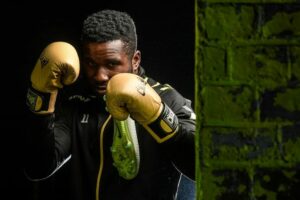
Boxing would become the teenage Yves’ hidden bad habit, concealed from his mother and father, despite the sport playing a pivotal role in helping him escape those who’d presented him with the temptation of fast money, earned through unsavoury deeds on the streets of West Flanders. They simply wouldn’t have approved.
During our telephone conversation, he explained, “As a child, my father was a football player for Anderlecht. They bought him from Congo and that’s why we came to Belgium. He played in the city [of Roesalare] and that is where I was born. That’s why we ended up in Belgium, so growing up, I was always in a football family. Before I left Belgium, I was still playing football. If I was at home, I would still be playing because I love football. It’s only because I am here in the UK that I have stopped.”
It’s perhaps uncommon for an athlete of his level to master both sports, let alone earn a living from either, yet Yves was playing for Belgian side KSKV Zwevezele as recently as last year. He’d taken time off to prepare for his title challenge, becoming the nation’s first cruiserweight champion.
When defeating Tamas Lodi in June 2017, he’d forced himself into contention amongst boxing’s top names, both in Europe and overseas. The rankings committees and the industry’s media were forced to take notice of the unbeaten thirty-year old. People questioned his ability, sneaking from the shadows of Belgian boxing to snatch the blue belt, defending it alongside the running of both the inaugural and secondary cruiserweight World Boxing Super Series.
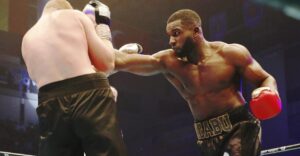
“I was fifteen-years old [when I started to box]”, detailed one the newest additions to the famed Ingle roster. “I needed something to get me on the right path in life and my friend was boxing, so I went with him to train. After the first session, I realised this was what I needed, I liked it and the trainer said that he could see something in me. I started then and I haven’t left the gym since. It was really hard for me [to take boxing seriously] because I was from that football family.”
“Boxing, as a sport in Belgium, especially when I was younger it wasn’t seen as a good thing. It’s not a ‘clean’ sport. My parents didn’t like that I was doing it. Even my first amateur fight, I didn’t say it to anybody. My whole family was against it. I didn’t stop and when I became the Belgian champion, then they started to change [their minds]. [Cos’ I could have been in] trouble, yeah, you know when you’re younger and you end up going the wrong way? I’m sure that if I didn’t have boxing that I would have ended up in a bad place.
“Because of boxing, I learned about dedication, respect and these things got me on the right path. Before, when I was younger, I had to fight a lot against racism and all of these things. Where I come from, it’s a tough place. Where we lived, there was maybe three black families [in the town]. It was not easy, I had to always fight and with the boxing I could release this.
“If I could speak to myself as a younger Yves, I would say, ‘Stay out of trouble, surround yourself with people that want to chase greatness, believe in yourself and know that not everybody is racist, but even if they are that you don’t have to hate them – just continue working and the right people will come your way.‘”
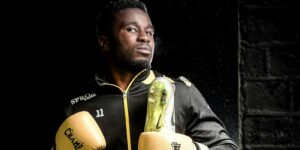
The ‘right people’ had come strangely in the form of the bulking, well respected head trainer from Sheffield, Dominic Ingle and his lively band of boxers. The Wincobank facility had housed multiple world champions, though recently had opened its doors to a number of exciting prospects, such as; Jason Quigley, Willy Hutchinson and Liam Williams.
The Sheffield boxing stalwarts of the last decade remained close to the Ingle gym, and Yves had settled in nicely amongst the stable, often featuring on the social media profiles of the Welshman, Liam Williams, and young Scottish prodigy, Willy Hutchinson.
As for his arrival in Sheffield, the story seemed back-to-front. After capturing the European title, he’d been buoyed by the possibility of world titles, but was aware that the facilities in Belgium may prevent him from realising his full potential. Nights spent trawling the internet, absorbing clips of fighters from the current era and plenty from the recent past, the champion took a leap of faith, which would eventually result in evenings spent ensconced in the gloomy rain shadows of South Yorkshire.
“Before I came here to the UK, I was in the United States and I could have stayed there, too, because I had a lot of people who wanted to work with me, but I came back to Belgium. I was in Vegas for eight or nine weeks. I trained at the Mayweather gym. I trained at Tony Tucker’s gym and at the place where Michael Hunter trains and Amir Khan trains, with Bones Adams. He wanted to work with me and even at the Mayweather Gym, I had a couple of trainers who wanted to work with me.
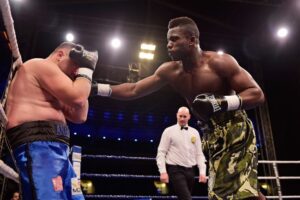
“I wanted first to come to the UK before I made my decision [about my new trainer] and I had a couple of phone numbers. I had four different [potential] trainers and I wanted to come to the Ingle gym because of the dedication they have here, the education, the style. I was very lucky because they don’t take many fighters. They wanted me to come over and I did some sessions with Dominic and we got on. The gym is unbelievable. It’s very good and it’s not as though we have ‘superstars’ in the gym. Everybody is treated the same way.
“I used to wake up [and watch] when Kell Brook or Billy Joe Saunders fought. I would watch them on YouTube, so for me it’s very good to train with them. It’s a big achievement to train with these people. I’m sure I made the right decision for my career. I stay here all the time. I just train and I have some football players that I know, so sometimes I will go and watch them play at the weekends. I train, eat and sleep [boxing], this is all I do. Maybe one weekend every two months I go back to Belgium, but most of the time I am here in the UK.”
The difficulties the Ngabu family had experienced when settling back home in Belgium were not an issue for Yves in the Steel City. He’d been welcomed with open arms and had links with some of the Premiership’s highest-profile Belgian footballers.
Recently signed by American management company Wasserman, he now shared representation with Liverpool stars Divock Origi and Virgil Van Dijk. An increase in Ngabu’s exposure was inevitable, especially with his upcoming bout at the end of October on the undercard of the Josh Taylor v Regis Prograis unification fight, the final of this season’s junior-welterweight World Boxing Super Series.
In fighting Lawrence Okolie, Yves would be squaring off against an undefeated champion yet to capture the hearts of his own domestic audience. The power and physical attributes of the home fighter have always been prevalent, yet his footwork and shot selection have been called into question, often times, criticised. What the Londoner has in place now with Shane McGuigan, is a versatile, experienced trainer.
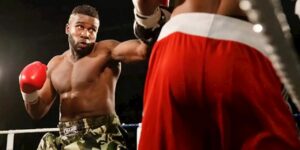
This clash between the pair had been mooted for sometime, since the dissolution of a fight between the reigning British champion and former Russian world champion, Denis Lebedev. Enjoying his physical prime, Ngabu seemed confident he could spring an upset at London’s O2 Arena.
Despite a sizeable height advantage for the challenger, it could prove to be the defining, explosive test for both men, propelling the winner almost immediately into world title contention. The Belgian had most recently conquered fancied Danish fighter, Micki Neilson, in February of this year and believed preparation was key. Time spent studying his opponents had come naturally as boxing had become something of an addiction.
He rated the raw professional known as ‘The Sauce’, but was assured in claiming that he would be Okolie’s true acid test. Ngabu remained respectful – but refused to bow down to profile and popularity.
“I have watched a lot [of Lawrence]. I watched his last two fights, I was there ringside and he’s a good fighter. I just don’t know if he has been tested yet. This is something I want to see, because those last two, the fighters were nervous about his power. I came here to do it the hard way and I am planning to win. I want it very bad, to get where I want and I will be coming to fight. His last two opponents, they didn’t come to fight. I know I’m gonna do everything [to win], because this fight is the key to world level.
“He hasn’t fought a guy that really stands there, giving punches and taking punches, we will see on October 26th – but he is a good fighter and he is undefeated. I am not a very big cruiserweight. I’m used to fighting these big, tall guys. It is normal and my last two fights are [against] tall guys with that long-range, so for me it is just normal. I’m not very impressed, but we will see. I have always had to fight against tall guys, now I am not that tall, but I have long-range, as well.
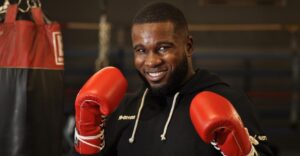
“When I came here, that [fight with Okolie] was the first thing I was asking for. I wanted to fight the best cruiserweight here because I had taken hard fights. I had to first fight Micki Neilson this year, but this [Okolie fight] is something that I wanted, it was something I planned.
“I wanted to come to the UK, train with one of the best trainers that I can – fight the best cruiserweight in the UK and do it here [in the UK]. Where I come from, you have to have a plan, because the sport of boxing in Belgium is not as big. These are the things that I must do to get to world level.”
As he caught the train back to Sheffield, the importance of his fight with Lawrence Okolie started to truly sink in. He’d taken the road less travelled, gambling heavily on himself, turning his back on the bright lights of Las Vegas to follow his dreams in the North of England. Those around him believe he has what it takes to scale boxing’s heights – the ball was in his court.
Whether it was turning the other cheek, suffering racial discrimination in a place he called ‘home’, or hiding boxing entirely from his parents, testing their patience and acceptance, Yves Ngabu had travelled far enough to know that turning back now wasn’t an option.
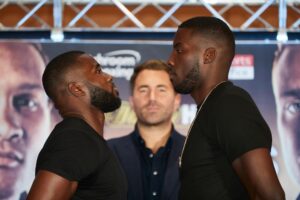
Impassioned, he concluded, “I came here the hard way and I know the bad side of the sport. The hardest thing for me was to surround myself with the right people and I still don’t. I still have to keep working on that. If I was not strong mentally, I would have given up boxing a long time ago. I have had a lot [of people trying to become involved], but now only my brother is around me.
“In Belgium, it’s not like here. Here you have the promoters, you have social media and boxing is a great sport. But where I come from, you have nothing. Nothing like that. That’s the hardest part, trying to be in the right place at the right time.
“Now I have the chance to fight and to show myself to the world. I’m a guy that comes to fight and I’m not planning on leaving my title here. I think my opponent is coming to fight and so, the people will see a great fight [on October 26th].”
Interview written by: Craig Scott
Follow Craig on Twitter at: @craigscott209